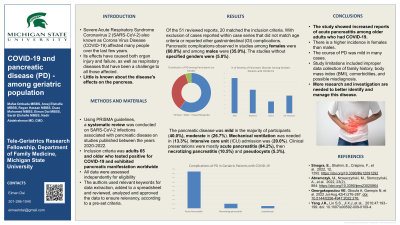Monday Poster Session
Category: Biliary/Pancreas
P1422 - COVID-19 and Pancreatic Disease - Among Geriatric Population
Monday, October 23, 2023
10:30 AM - 4:15 PM PT
Location: Exhibit Hall

Has Audio

Eiman Dai, MBBS
Michigan State University
Astoria, NY
Presenting Author(s)
Mafaz Ombada, 1, Areej Elshafie, MBBS2, Rayan Hassan, MBBS3, Duaa Mohamed, MBBS4, Eiman Dai, MBBS5, Sarah Elshafie, MBBS2, Nadir Abdelrahman, MD2
1Michigan State University, Jeddah, Makkah, Saudi Arabia; 2Michigan State University, East Lansing, MI; 3Michigan State University College of Human Medicine, Kitchener, ON, Canada; 4Michigan State University, Milwuakee, WI; 5Michigan State University, Astoria, NY
Introduction: Severe Acute Respiratory Syndrome Coronavirus 2 (SARS-CoV-2) also known as COVID-19 affected many people over the last few years. Its effects have caused both organ injury as well as respiratory diseases that have been a challenge to all those affected. Little is known about the disease's effects on the pancreas. This study aims to identify the pancreatic complications that COVID-19 causes among the geriatric population.
Methods: Using the Preferred Reporting Items for Systematic Reviews and Meta-Analysis (PRISMA) guidelines, a systematic review was conducted on SARS-CoV-2 infections associated with pancreatic disease (PD) on studies published between the years 2020-2022. Inclusion criteria was adults 65 and older who tested positive for COVID-19 and exhibited pancreatic manifestation worldwide. Exclusion criteria was anyone 64 and under. Multiple academic libraries: PubMed, National Library of Medicine, Google Scholar, International Journal of Clinical Pediatrics, and World Journal of Gastroenterology. In addition, scholarly databases. Google search engine technology were used to extract relevant data. All data were assessed independently for eligibility. The authors used relevant keywords for data extraction, added to a spreadsheet, reviewed, analyzed and approved the data to ensure relevancy, according to a pre-set criteria.
Results: Of the 51 reviewed reports, 20 matched the inclusion criteria. With exclusion of cases reported within case series that did not match age criteria or reported other gastrointestinal (GI) complications. Pancreatic complications observed in studies among females were (60.0%) and among males were (35.0%). The studies without specified genders were (5.0%). PD was mild in the majority of participants (40.0%), moderate in (26.7%) and mechanical ventilation was needed in (13.3%). Intensive care unit (ICU) admission was (20.0%). PD described were mostly acute pancreatitis (84.2%), then necrotizing pancreatitis (10.5%) and pseudocysts (5.3%).
Discussion: The study showed increased reports of acute pancreatitis among geriatrics, with a higher incidence in females. Though the clinical course in both genders remained mild. Limitations attributed to the stressful pandemic effects on medical personnel included improper data collection of family history, body mass index, comorbidities, and possible misdiagnosis. This study wishes to shine a light on the c of COVID-19 in the pancreas. Also, to encourage further investigation to better identify and manage this disease.
Disclosures:
Mafaz Ombada, 1, Areej Elshafie, MBBS2, Rayan Hassan, MBBS3, Duaa Mohamed, MBBS4, Eiman Dai, MBBS5, Sarah Elshafie, MBBS2, Nadir Abdelrahman, MD2. P1422 - COVID-19 and Pancreatic Disease - Among Geriatric Population, ACG 2023 Annual Scientific Meeting Abstracts. Vancouver, BC, Canada: American College of Gastroenterology.
1Michigan State University, Jeddah, Makkah, Saudi Arabia; 2Michigan State University, East Lansing, MI; 3Michigan State University College of Human Medicine, Kitchener, ON, Canada; 4Michigan State University, Milwuakee, WI; 5Michigan State University, Astoria, NY
Introduction: Severe Acute Respiratory Syndrome Coronavirus 2 (SARS-CoV-2) also known as COVID-19 affected many people over the last few years. Its effects have caused both organ injury as well as respiratory diseases that have been a challenge to all those affected. Little is known about the disease's effects on the pancreas. This study aims to identify the pancreatic complications that COVID-19 causes among the geriatric population.
Methods: Using the Preferred Reporting Items for Systematic Reviews and Meta-Analysis (PRISMA) guidelines, a systematic review was conducted on SARS-CoV-2 infections associated with pancreatic disease (PD) on studies published between the years 2020-2022. Inclusion criteria was adults 65 and older who tested positive for COVID-19 and exhibited pancreatic manifestation worldwide. Exclusion criteria was anyone 64 and under. Multiple academic libraries: PubMed, National Library of Medicine, Google Scholar, International Journal of Clinical Pediatrics, and World Journal of Gastroenterology. In addition, scholarly databases. Google search engine technology were used to extract relevant data. All data were assessed independently for eligibility. The authors used relevant keywords for data extraction, added to a spreadsheet, reviewed, analyzed and approved the data to ensure relevancy, according to a pre-set criteria.
Results: Of the 51 reviewed reports, 20 matched the inclusion criteria. With exclusion of cases reported within case series that did not match age criteria or reported other gastrointestinal (GI) complications. Pancreatic complications observed in studies among females were (60.0%) and among males were (35.0%). The studies without specified genders were (5.0%). PD was mild in the majority of participants (40.0%), moderate in (26.7%) and mechanical ventilation was needed in (13.3%). Intensive care unit (ICU) admission was (20.0%). PD described were mostly acute pancreatitis (84.2%), then necrotizing pancreatitis (10.5%) and pseudocysts (5.3%).
Discussion: The study showed increased reports of acute pancreatitis among geriatrics, with a higher incidence in females. Though the clinical course in both genders remained mild. Limitations attributed to the stressful pandemic effects on medical personnel included improper data collection of family history, body mass index, comorbidities, and possible misdiagnosis. This study wishes to shine a light on the c of COVID-19 in the pancreas. Also, to encourage further investigation to better identify and manage this disease.
Disclosures:
Mafaz Ombada indicated no relevant financial relationships.
Areej Elshafie indicated no relevant financial relationships.
Rayan Hassan indicated no relevant financial relationships.
Duaa Mohamed indicated no relevant financial relationships.
Eiman Dai indicated no relevant financial relationships.
Sarah Elshafie indicated no relevant financial relationships.
Nadir Abdelrahman indicated no relevant financial relationships.
Mafaz Ombada, 1, Areej Elshafie, MBBS2, Rayan Hassan, MBBS3, Duaa Mohamed, MBBS4, Eiman Dai, MBBS5, Sarah Elshafie, MBBS2, Nadir Abdelrahman, MD2. P1422 - COVID-19 and Pancreatic Disease - Among Geriatric Population, ACG 2023 Annual Scientific Meeting Abstracts. Vancouver, BC, Canada: American College of Gastroenterology.
